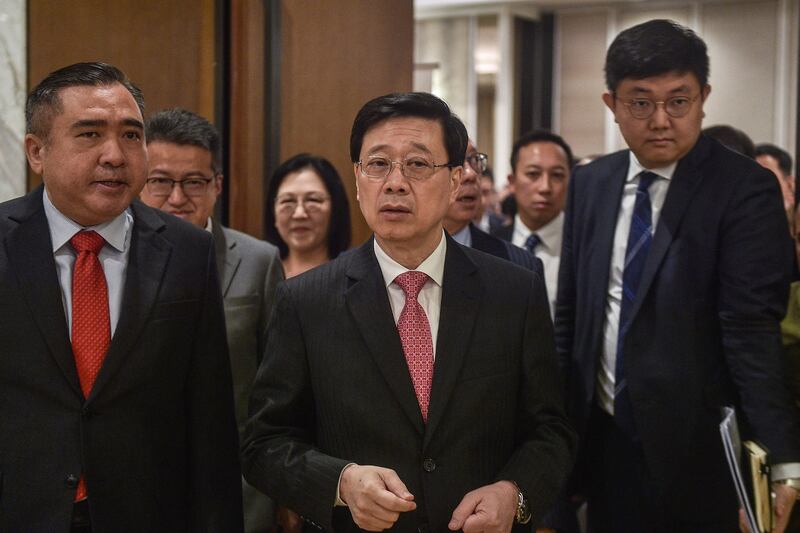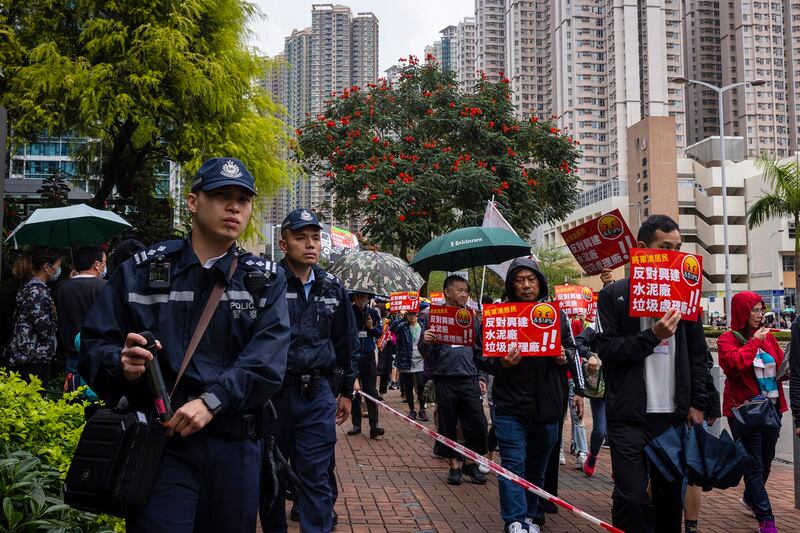Hong Kong leader John Lee has been holding "public consultation" meetings ahead of his annual policy address in October, with one catch – nobody who attends appears to take issue with government policy or criticize his performance.
Lee told reporters during a briefing this week that he has scheduled more than 30 "public consultation meetings" ahead of his forthcoming policy address.
The petitions and demonstration areas outside Hong Kong’s government headquarters and Office of the Chief Executive once offered an opportunity for members of the public, civil society groups and pro-democracy figures to express their demands to officials in person.
But it appears that ordinary citizens standing up and speaking, sometimes shouting, truth to power – once a common feature of Hong Kong's political life and of live TV and radio shows – is quickly becoming a thing of the past.
In video streams of two "regional consultations" on Aug. 20 and 27, the venues for Lee's consultations appeared to be packed with around 100 members of the "public."
But no media were allowed into the hall, and attendance was strictly invitation only.
Some 30 people did stand up and ask questions, but at least one-third were members of pro-government political parties or delegates representing Hong Kong at the Chinese Communist Party's Political Consultative Conference, according to Legislative Councilor Tik Chi-yuen.
Several others had a background in the uniformed services or local government, where only pro-government candidates can now run for election, Tik told the Ming Pao newspaper.

In two hours of questions and answers, not a single person at either event complained about the government in any way, according to the video livestreams of the event.
Instead, they maintained a harmonious and collegial atmosphere, skating over the surface of regional issues without mentioning anything too political.
'Closed circle' pool of participants
The government launched the consultation exercise for the Oct. 25 policy address in late July, announcing that Lee "earnestly invites members of the public to give their views."
“My team and I will continue to listen carefully to your views and do our utmost for the people's livelihood and the economy,” an official press release quoted Lee as saying.
People were invited to give their views through the Policy Address website, the dedicated Facebook page, by email and phone or fax, according to the press release.
But Tik told the Ming Pao that the consultation meetings drew participants from too small a pool, a "closed circle," with no democrats or young people allowed to take part.
Meanwhile, Lee said on Tuesday that he has no plans to bring back arrangements for members of the public to approach him with petitions ahead of his weekly meeting with the city's Executive Council, after they were suspended during the COVID-19 restrictions.
"I don't think we need a special area outside the ExCo meeting to do this, because there are so many channels available," Lee said. "I often visit different districts, particularly during the consultation period for my policy address."
"And everyone can see that government officials are very proactive in meeting members of the public," Lee said. "If any member of the public has an opinion, they can tell us directly."
Lee made no mention of the fact that the members of the public he meets at district level are hand-picked supporters of the government, and usually hail from pro-Beijing or pro-establishment backgrounds.
Since Lee was "elected" last year in a one-horse race, his administration has told anyone with opinions or complaints to address them to the government in writing, or by phone.
The government's general contact page offers an e-form and an email address for people to contact officials.
"If appropriate, your enquiry or complaint will be referred to the relevant officer for follow-up," it says, while providing a directory of government phone numbers.
Approvals for political rallies
Meanwhile, anyone wanting to demonstrate or hold a political rally must first get approval from the police, who have approached organizers in recent months and forced them to call off planned marches.

Other marches have gone ahead with participants registering with their real names for numbered name-badges, and forced to walk within a moving police cordon.
Even during Carrie Lam's highly unpopular tenure as chief executive, members of the public could still get close enough to berate her, particularly over her plans to allow the extradition of alleged criminal suspects to mainland China that sparked the mass protest movement of 2019.
"It's because of you! It's you!" one speaker told Lam at a town-hall meeting she called to try to defuse the protests through dialogue in 2019.
"You have total disregard for public opinion. It's due to your inability to govern. Most of the responsibility lies with you and you should step down," the person said, who got their ticket to the event after a computer drew random lots from a pool of applicants.
Many others took a similarly argumentative tone with Lam at the time. But by the time it came to hold public consultations for her last policy address in 2021, Lam had reduced the number of randomly selected applicants to 10%, with many more pro-government speakers invited instead.
Translated with additional reporting by Luisetta Mudie .
